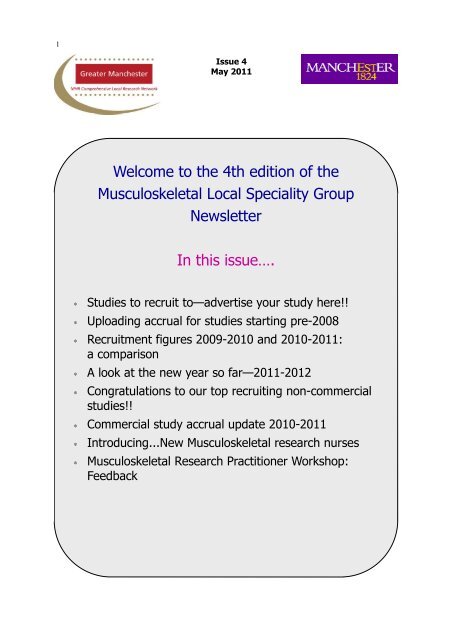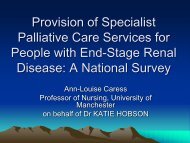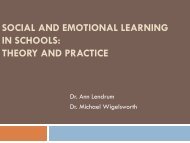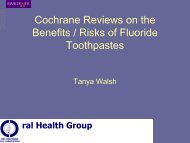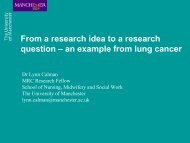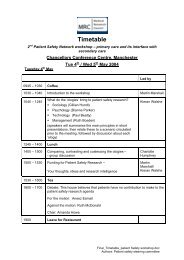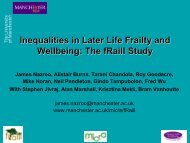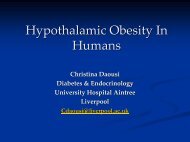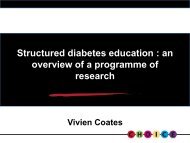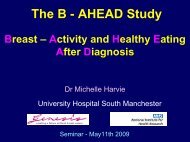4th edition new draft.pub - The University of Manchester
4th edition new draft.pub - The University of Manchester
4th edition new draft.pub - The University of Manchester
Create successful ePaper yourself
Turn your PDF publications into a flip-book with our unique Google optimized e-Paper software.
1<br />
Issue 4<br />
May 2011<br />
Welcome to the <strong>4th</strong> <strong>edition</strong> <strong>of</strong> the<br />
Musculoskeletal Local Speciality Group<br />
Newsletter<br />
In this issue….<br />
∗<br />
∗<br />
Studies to recruit to—advertise your study here!!<br />
Uploading accrual for studies starting pre-2008<br />
∗ Recruitment figures 2009-2010 and 2010-2011:<br />
a comparison<br />
∗<br />
∗<br />
A look at the <strong>new</strong> year so far—2011-2012<br />
Congratulations to our top recruiting non-commercial<br />
studies!!<br />
∗ Commercial study accrual update 2010-2011<br />
∗<br />
∗<br />
Introducing...New Musculoskeletal research nurses<br />
Musculoskeletal Research Practitioner Workshop:<br />
Feedback
2<br />
Studies to recruit to<br />
BILAG Biologics Register (BILAG BR)<br />
Short title: BILAG Biologics Prospective Cohort<br />
Full title <strong>of</strong> the research: BILAG Biologics Prospective Cohort: <strong>The</strong> Use <strong>of</strong> Novel<br />
Biological <strong>The</strong>rapies in the Treatment <strong>of</strong> Systemic Lupus Erythematosus (SLE)<br />
REC Reference Number: 09/H1014/64<br />
CSP reference: 24407<br />
UK CRN ID: 8251<br />
<strong>The</strong> BILAG Biologics Prospective Cohort is a prospective observational cohort study <strong>of</strong><br />
patients with SLE who are starting treatment with a biologic drug or a conventional, nonbiologic<br />
therapy. <strong>The</strong> study aims to recruit 220 patients into the biologic treatment group<br />
and a further 220 patients into the conventional, non-biologic therapy cohort.<br />
<strong>The</strong> aim <strong>of</strong> the BILAG BR is to ascertain whether using biologics in the routine treatment<br />
<strong>of</strong> SLE is associated with an increased risk <strong>of</strong> hospitalisation for infection, compared to<br />
SLE patients with similar disease activity receiving conventional therapies. <strong>The</strong><br />
secondary purpose <strong>of</strong> the BILAG Biologics Prospective Cohort is to determine the longterm<br />
efficacy <strong>of</strong> biological therapies in the treatment <strong>of</strong> SLE.<br />
This prospective cohort study will recruit an exposed cohort <strong>of</strong> patients with SLE treated<br />
with biological therapies and an unexposed cohort <strong>of</strong> patients with similar disease<br />
characteristics but exposed only to conventional non-biological therapies.<br />
Comprehensive data will be collected at baseline, from the clinic team and the patient,<br />
including data on disease diagnosis and activity, risk factors for infection and routine<br />
laboratory results. Follow-up data will be collected at 3, 6, 12, 24 and 36 months to<br />
include any changes in medications, adverse events, hospitalisations for infections,<br />
disease activity and quality <strong>of</strong> life along with biological samples for biomarker analysis.<br />
Contact<br />
If you would like any additional information regarding the study, please contact Emily<br />
Sutton, BILAG BR Study Coordinator.<br />
Email: Emily.sutton@manchester.ac.uk<br />
Tel: 0161 3061916<br />
Fax: 0161 2751640<br />
BILAG BR<br />
Arthritis Research UK Epidemiology Unit<br />
<strong>The</strong> <strong>University</strong> <strong>of</strong> <strong>Manchester</strong><br />
Rutherford House (Unit 4)<br />
<strong>Manchester</strong> Science Park<br />
40 Pencr<strong>of</strong>t Way<br />
MANCHESTER<br />
M15 6SZ
3<br />
Studies to recruit to<br />
MYOSITIS GENETICS STUDY<br />
Polymyositis (PM), dermatomyositis (DM) and Inclusion Body<br />
Myositis (IBM) belong to a group <strong>of</strong> inflammatory muscle disorders, <strong>of</strong><br />
unknown cause, that are characterised by skeletal muscle inflammation<br />
and progressive muscular weakness, which can be debilitating and chronic<br />
in nature. <strong>The</strong> current treatment options for these conditions are steroids<br />
and various other immunosuppressive drugs. However, these are usually<br />
only partially effective at reducing symptoms, and their toxic side effects<br />
also limit their usefulness. In order to develop more specific treatments for<br />
myositis in the future (and therefore more effective), it is important to<br />
understand the exact mechanisms that cause the disease in the first<br />
instance. In other similar inflammatory diseases such as rheumatoid<br />
arthritis and lupus, it is known that changes to the Human Leukocyte<br />
Antigen (HLA), as well as certain inflammatory cytokines, are involved in<br />
both the development and expression <strong>of</strong> the disease. As many <strong>of</strong> the<br />
inflammatory mechanisms that cause damage in PM, DM and IBM are<br />
similar to those in RA and SLE, it seems likely that similar genetic factors<br />
will also be involved in the development and expression <strong>of</strong> PM, DM and<br />
IBM. In order to understand the genetic aspects / causes <strong>of</strong> myositis, and<br />
ultimately develop more effective treatment therapies in the future,<br />
patients with PM, DM or IBM, are being asked to give 20 mls <strong>of</strong> blood.<br />
<strong>The</strong>se blood samples, along with the patient’s clinical details, will then be<br />
sent to the Centre for Integrated Genomic Medical Research (CIGMR), at<br />
<strong>The</strong> <strong>University</strong> <strong>of</strong> <strong>Manchester</strong>, where all <strong>of</strong> the genetic analyses will take<br />
place. By understanding the genetic cause <strong>of</strong> the disease, it should be<br />
possible to design specific drugs for treating the condition in the future.<br />
For further information about recruiting to this study (portfolio ID 7996)<br />
please contact Paul New at Salford Royal NHS Foundation Trust at:-<br />
Email: Paul.<strong>new</strong>@srft.nhs.uk<br />
Telephone: 0161 206 4295
4<br />
Studies to recruit to<br />
ESOS (European Scleroderma Observational Study) is a <strong>new</strong> prospective<br />
observational study comparing treatment outcomes in early diffuse<br />
cutaneous systemic sclerosis (dcSSc). <strong>The</strong> study is funded as part <strong>of</strong><br />
the EULAR Orphan Disease Programme, which aims to improve knowledge<br />
<strong>of</strong> the pathogenesis and treatment <strong>of</strong> SSc. It has been accepted onto the<br />
NIHR Portfolio (ID 8799) under the musculoskeletal topic.<br />
ESOS is coordinated by the <strong>University</strong> <strong>of</strong> <strong>Manchester</strong> and will involve<br />
the documentation <strong>of</strong> current best practice (using a web-based data<br />
collection system) in patients with early dcSSc. <strong>The</strong> four treatment<br />
protocols being recruited are; methotrexate, mycophenolate m<strong>of</strong>etil,<br />
cyclophosphamide, and also those receiving no immunosuppressant<br />
treatment. Recruitment started in July 2010 in centres across Europe and<br />
will continue for the next 2 years.<br />
If you have a patient with early dcSSc (defined as within 3 years <strong>of</strong> the<br />
onset <strong>of</strong> skin thickening) who might be eligible you can:<br />
Visit the study website: http://www.ssc-esos.net<br />
Or<br />
E-mail the study co-ordinator: holly.ennis@manchester.ac.uk
5<br />
Studies to recruit to
6<br />
Uploading accrual for studies starting pre-2008<br />
After review <strong>of</strong> the National Musculoskeletal<br />
Disorders Speciality Group portfolio, it became<br />
evident that several studies that started prior to<br />
the set-up <strong>of</strong> the NIHR portfolio were being<br />
highlighted as under-recruiting to target. For many studies,<br />
recruitment figures prior to 2008 were not being uploaded,<br />
thereby affecting the % recruitment to target.<br />
NIHR CRN CC guidelines on uploading recruitment data to the<br />
standard template spreadsheet states “Running total - <strong>The</strong> total<br />
<strong>of</strong> the number <strong>of</strong> participants that have been recruited into the<br />
study. If recruitment began before April 2008, the running total<br />
should also include all participants recruited before this date<br />
(not all participants will be listed in the spreadsheet, but all<br />
participants should be counted in the running total)…..<strong>The</strong><br />
running total is used to generate the Total accrual to date<br />
percentage bar displayed on the study record in the <strong>pub</strong>lic<br />
Portfolio database.”<br />
And in the FAQ section <strong>of</strong> the guidelines it states “As<br />
activity-based funding allocations to CLRNs will be based on<br />
activity from 1 April 2008, a line <strong>of</strong> data is required for every<br />
study participant recruited after 31 March 2008. We encourage<br />
study coordinators to provide a line <strong>of</strong> data for each participant<br />
recruited prior to April 2008 in order to provide baseline data.<br />
Where this is not possible we request that total numbers <strong>of</strong><br />
recruits are submitted wherever possible. When providing total<br />
numbers these should be submitted to the accrual team as two<br />
figures; recruitment for April 2007 to March 2008 and<br />
recruitment prior to April 2007. Totals should include all<br />
recruitment, including international recruits”<br />
You can review these guidelines in full by going to:<br />
http://www.crncc.nihr.ac.uk/about_us/processes/portfolio/p_recruitment/<br />
If you are experiencing specific problems with uploading your<br />
recruitment you can contact the portfolio team at:<br />
ccrn.portfolio@nihr.ac.uk
7<br />
Recruitment figures 2009-2010 and 2010-2011: a comparison<br />
140<br />
120<br />
100<br />
Recruitment<br />
80<br />
60<br />
40<br />
20<br />
0<br />
2009-2010<br />
2010-2011<br />
Month<br />
Nationally many studies are co-adopted between Musculoskeletal and other topics—Please note<br />
that the above graph includes co-adopted study involvement<br />
A look at the <strong>new</strong> year so far—2011-2012<br />
25<br />
25<br />
20<br />
Recruitment<br />
15<br />
10<br />
5<br />
0<br />
1<br />
2<br />
4 4<br />
1<br />
15<br />
4<br />
1<br />
3<br />
11<br />
4 4<br />
2<br />
1<br />
3<br />
3<br />
Apr-11<br />
May-11<br />
Study
8<br />
Top recruiting non-commercial studies 2010-2011<br />
140<br />
120<br />
100<br />
80<br />
60<br />
40<br />
20<br />
0<br />
BRAGGSS<br />
Developing<br />
the UK-EDAQ<br />
for arthritis<br />
Trace RA<br />
Endogenous<br />
pain control<br />
mechanisms<br />
PAALS<br />
National<br />
Repository<br />
portfolio<br />
ID<br />
Acronym Title Top<br />
recruiting<br />
site<br />
5114 BRAGGSS Investigation <strong>of</strong> genes influencing<br />
response to treatment with Infliximab,<br />
Etanercept and Adalumimab in patients<br />
with rheumatoid arthritis and related<br />
arthropathies<br />
<strong>Manchester</strong><br />
Royal<br />
Infirmary<br />
7084 EDAQ Developing the UK-EDAQ for arthritis North<br />
<strong>Manchester</strong><br />
General<br />
Hospital<br />
4076 Trace RA Trial <strong>of</strong> Atorvastatin for the primary<br />
prevention <strong>of</strong> Cardiovascular Events in<br />
Rheumatoid Arthritis<br />
4786 Endogenous pain control mechanisms in<br />
patients with chronic arthritic pain<br />
North<br />
<strong>Manchester</strong><br />
General<br />
Hospital<br />
Salford<br />
Royal<br />
(Hope)<br />
Hospital<br />
single<br />
centre<br />
8894 PAALS Pain Across the Adult Life Span Central<br />
Local PI/Invetigator<br />
Pr<strong>of</strong>essor Ian<br />
Bruce<br />
Pr<strong>of</strong>essor Alison<br />
Hammond/ Denise<br />
McSorland<br />
(research nurse)<br />
Dr Beverley<br />
Harrison/ Lorraine<br />
Lock/Denise<br />
McSorland<br />
(research nurses)<br />
Dr Alison Watson<br />
Dr John McBeth<br />
7881 National<br />
Repository<br />
Investigation <strong>of</strong> clinical, serological and<br />
genetic factors in the development <strong>of</strong><br />
arthritis and rheumatic diseases<br />
Mancheter/<br />
Wellcome<br />
Trustsingle<br />
centre<br />
<strong>Manchester</strong><br />
Royal<br />
Infirmary<br />
Pr<strong>of</strong>essor Ian<br />
Bruce/Dr Pauline<br />
Ho
9<br />
Commercial study accrual update 2010-2011<br />
26<br />
1 1 1 1 2 4<br />
7<br />
CCRN 098<br />
CCRN 099<br />
MCRN067<br />
MCRN069<br />
CCRN 092<br />
CCRN 078<br />
17<br />
PCRN010<br />
CCRN 097<br />
20<br />
18<br />
CCRN 067<br />
CCRN 065<br />
CCRN 100<br />
Study ID Acronym Study Title Active Status Recruiting sites<br />
CCRN 092<br />
A multi-centre, randomised, double-blind,<br />
parallel group study <strong>of</strong> the safety, remission<br />
and prevention <strong>of</strong> structural joint damage<br />
during treatment with tocilizumab (TCZ), as a<br />
monotherapy and in combination with<br />
methotrexate (MTX), versus MTX in patients<br />
with early, moderate to sever rheumatoid<br />
Trafford General<br />
6915 (RA) arthritis.<br />
Open Hospital<br />
6983<br />
6985<br />
CCRN 099<br />
(PRAD)<br />
CCRN 100<br />
(PRAD 2)<br />
Observational cohort study to evaluate the<br />
safety and efficacy <strong>of</strong> Pradaxa (dabigatran<br />
etexilate) in patients with moderate renal<br />
impairment (creatinine clearance 30-50ml/min)<br />
undergoing elective total hip replacement<br />
surgery or total knee replacement surgery Open<br />
Observational cohort study to investigate the<br />
safety and efficacy <strong>of</strong> Pradaxa (dabigatran<br />
etexilate) for the prevention <strong>of</strong> venous<br />
thromboembolism in patients undergoing<br />
elective total hip replacement surgery or total<br />
knee replacement surgery in a clinical setting. Open<br />
Wrightington<br />
Hospital<br />
Wrightington<br />
Hospital<br />
7770 MCRN069<br />
6939 PCRN010<br />
An open-label extension study <strong>of</strong> canakinumab<br />
(ACZ885) in patients with Systemic Juvenile<br />
Idiopathic Arthritis (SJIA) and active systemic<br />
manifestations<br />
Open<br />
A randomised open-label study to evaluate the<br />
safety and efficacy <strong>of</strong> denosumab and monthly<br />
actonel® therapies in postmenopausal women<br />
transitioned from weekly or daily alendronate<br />
therapy<br />
Open<br />
Royal <strong>Manchester</strong><br />
Children's Hospital<br />
Synexus<br />
<strong>Manchester</strong> Clinical<br />
Research Centre
10<br />
Commercial study accrual update 2010-2011<br />
Study ID Acronym Study Title Active Status Recruiting sites<br />
An open-label study assessing the addition <strong>of</strong><br />
subcutaneous golimumab (GLM) to<br />
conventional disease-modifying antirheumatic<br />
drug (DMARD) therapy in biologic-naïve<br />
subjects with rheumatoid arthritis (Part 1)<br />
followed by a randomised study assessing the<br />
value <strong>of</strong> combined intravenous and<br />
subcutaneous GLM administration aimed at<br />
inducing and maintaining remission (Part 2)<br />
6678<br />
CCRN 065<br />
(RA)<br />
Closed - in<br />
follow-up<br />
<strong>Manchester</strong> Royal<br />
Infirmary/<br />
Wrightington<br />
Hospital<br />
6681<br />
CCRN 067<br />
(RA)<br />
A 3-phase study to evaluate sustained<br />
remission and productivity outcomes in<br />
subjects with early rheumatoid arthritis initiated<br />
on treatment with etanercept plus<br />
Closed - in<br />
methotrexate<br />
follow-up<br />
<strong>Manchester</strong> Royal<br />
Infirmary/<br />
Wrightington<br />
Hospital<br />
6887<br />
CCRN 078<br />
(Tendon<br />
repair)<br />
A randomised, double blind clinical<br />
investigation to evaluate the safety, tolerability,<br />
and preliminary performance <strong>of</strong> Adaprev in<br />
Improving recovery <strong>of</strong> tendon function in<br />
subjects undergoing surgical repair <strong>of</strong> flexor<br />
tendons in Zone II <strong>of</strong> the hand<br />
Closed - in<br />
follow-up<br />
Wythenshawe<br />
Hospital<br />
6989<br />
CCRN 097 (RA<br />
- TNF)<br />
A global multi-centre observational study in<br />
rheumatoid arthritis (RA) patients who are<br />
non-responders or intolerant to a single tumor<br />
necrosis factor (TNF)-inhibitor<br />
Closed - in<br />
follow-up<br />
<strong>Manchester</strong> Royal<br />
Infirmary/ Salford<br />
Royal Hospital/<br />
Stepping Hill<br />
Hospital/<br />
Wrightington<br />
Hospital<br />
6969<br />
Efficacy and safety <strong>of</strong> eslicarbazepine acetate<br />
as therapy in patients with fibromyalgia: A<br />
CCRN 098 double-blind, randomised, placebo-controlled,<br />
(Fibromyalgia) parallel-group, multicentre clinical trial<br />
Closed - in<br />
follow-up<br />
<strong>Manchester</strong> Royal<br />
Infirmary<br />
7768 MCRN067<br />
A randomized, double-blind, placebo controlled,<br />
withdrawal study <strong>of</strong> flare prevention <strong>of</strong><br />
canakinumab (ACZ885) in patients with<br />
Systemic Juvenile Idiopathic Arthritis (SJIA) and Closed - in<br />
active systemic manifestations<br />
follow-up<br />
Royal <strong>Manchester</strong><br />
Children's Hospital
11<br />
Introducing the <strong>new</strong> research nurses<br />
<strong>The</strong>re have been several <strong>new</strong> Musculoskeletal research nurses appointed in<br />
2011. Let us introduce…….<br />
Name: Jane McConniffe<br />
Base: Arthritis research UK Epidemiology Unit, <strong>The</strong> <strong>University</strong> <strong>of</strong><br />
<strong>Manchester</strong><br />
Role: Peripatetic research nurse. Jane’s role is to travel to sites across<br />
Greater <strong>Manchester</strong> assisting with screening and recruitment to studies on<br />
the Musculoskeletal portfolio.<br />
Name: Lindsey Barber<br />
Base: Stockport NHS Foundation Trust, Stepping Hill Hospital<br />
Role: Lindsey’s role is to develop and maintain the Musculoskeletal<br />
portfolio at Stepping Hill Hospital. She will be recruiting to TOPKAT (Total<br />
Or Partial Knee Arthroplasty Trial) as well as some other Rheumatology<br />
studies.<br />
Name: Penny Storrs<br />
Base: Salford Royal, Hope Hospital<br />
Role: Penny is employed part-time to work on a variety <strong>of</strong> portfolio<br />
studies at Salford Royal. She will be working on studies for Dr Ariane<br />
Herrick, Dr Terry O’Neill and Pr<strong>of</strong>essor Anthony Jones.<br />
We would like to take this opportunity to wish the nurses well in their<br />
posts!!
12<br />
Musculoskeletal Research Practitioner Workshop<br />
Wrightington, 29th March 2011<br />
On Tuesday 29th March Greater <strong>Manchester</strong> and Cheshire & Merseyside<br />
CLRNs ran a combined workshop aimed at Musculoskeletal research<br />
practitioners. <strong>The</strong> workshop was held at Wrightington Hospital Conference<br />
Centre and focussed around 3 main topics:<br />
∗<br />
∗<br />
∗<br />
Recruitment to trials<br />
MHRA inspections: how to prepare<br />
Intention to treat analysis and patient retention<br />
We would like to thank Ella Bacabac and Angie Miller (research nurses from<br />
Cheshire & Merseyside) along with Pr<strong>of</strong>essor Deborah Symmons, for<br />
running these workshops.<br />
Thank you also to Pr<strong>of</strong>essor John Goodacre (Musculoskeletal Lead, Cumbria<br />
& Lancashire CLRN) for his introductory lecture entitled “Training and<br />
development <strong>of</strong> the NIHR workforce <strong>of</strong> the future”.<br />
<strong>The</strong> half-day event was well-attended by people from all 3 CLRNs and<br />
provided an opportunity for research practitioners, working in the same<br />
area <strong>of</strong> research to meet.<br />
<strong>The</strong>re was also an opportunity to meet some <strong>of</strong> the study co-ordinators<br />
and view the study material that was on display.<br />
<strong>The</strong> afternoon ended with a short GCP quiz co-ordinated by Hawys Williams<br />
(TRACE RA trial manager) and the winning groups went home with some<br />
lovely chocolatey goods!<br />
<strong>The</strong> afternoon was a success and a feedback survey was sent to those who<br />
attended the workshop for their comments. You can view the results <strong>of</strong> the<br />
survey on the next page.
13<br />
Workshop survey feedback<br />
1. To which CLRN are you affiliated Response %<br />
Greater <strong>Manchester</strong> 66.7%<br />
Cheshire & Merseyside 8.3%<br />
Cumbria & Lancashire 25%<br />
2. Please select the option which best describes your role within<br />
musculoskeletal research<br />
Research nurse 41.7%<br />
Physiotherapist 16.7%<br />
Trial co-ordinator 25%<br />
Doctor 0%<br />
Occupational therapist 0%<br />
other 16%<br />
3. How interesting and informative did you find the opening presentation<br />
“Training and development <strong>of</strong> the NIHR workforce <strong>of</strong><br />
the future”<br />
Very interesting 16.7%<br />
Interesting 83.3%<br />
No <strong>new</strong> information provided 0%<br />
Not relevant to me 0%<br />
4. How useful and informative did you find each <strong>of</strong> the workshop<br />
sessions (scored 1-5 with 1 being the lowest)<br />
Recruitment to trials 33.3% (5)<br />
33.3% (3)<br />
MHRA inspections – how to prepare 33.3% (5)<br />
41.7% (3)<br />
8.3% (2)<br />
Intention to treat analysis and patient retention 41.7% (5)<br />
25.0% (4)<br />
33.3% (3)<br />
5. Was the workshop a good networking opportunity<br />
Yes 83.3%<br />
No 8.3%<br />
Not sure 8.3%<br />
6. Were there sufficient opportunities to ask questions<br />
Yes 100%<br />
No 0%<br />
Not sure 0%<br />
7. Would you be interested in attending similar workshops/<br />
events in the future<br />
Yes 83.3%<br />
No 8.3%<br />
Maybe 8.3%<br />
8. Any feedback or suggestions for future workshops:<br />
Longer time spent on each workshop<br />
Better introduction time so all attendees know who each other are
14<br />
And finally………<br />
Donna Taylor-Fesler will be leaving Stockport NHS Foundation Trust and<br />
continuing in the role <strong>of</strong> Administrator for the Musculoskeletal Local<br />
Speciality Group at the <strong>University</strong> <strong>of</strong> <strong>Manchester</strong> from 1st May 2011. From<br />
end <strong>of</strong> April 2011 the e-mail address:<br />
musculoskeletal@stockport.nhs.uk will no longer be in use.<br />
Donna’s <strong>new</strong> e-mail address is: musculoskeletal@manchester.ac.uk<br />
Musculoskeletal local speciality group contacts:<br />
Call us:<br />
e-mail us:<br />
Pr<strong>of</strong>essor Deborah Symmons 0161 275 5044<br />
deborah.symmons@manchester.ac.uk<br />
Donna Taylor-Fesler 0161 275 3229 musculoskeletal@manchester.ac.uk<br />
Lorraine Lock 0161 275 3229 Lorraine.lock@manchester.ac.uk<br />
Jane McConniffe 0161 275 3229 jane.mcconniffe@manchester.ac.uk<br />
Please pass this <strong>new</strong>sletter onto anyone else who you think would be<br />
interested in receiving it, or alternatively, please provide their name and e-mail<br />
address so that they can be added to the mailing list!


